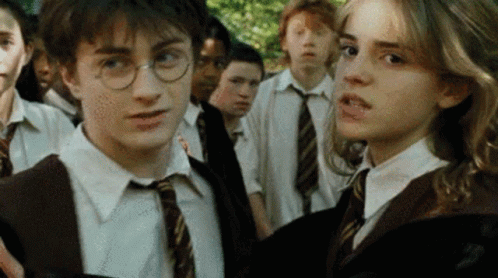"a receptacle prepared by dark magic in which a Dark wizard has intentionally hidden a fragment of his soul for the purpose of attaining immortality."
It is said that the author (that shall not be named) detailed a horrific process to create a horcrux, and while I do not agree with said author in any way, shape or form, the concept of a horcrux has been the perfect analogy lately.
Why would someone working in community coach development feel so strongly about dark magic, you might ask? Why does this nerd insist that they are part of a magical universe? Well, it's a coping mechanism to deal with the ridiculous reality of trying to convince volunteers that they should care about their practice.
Don't get me wrong, I am well aware that any parent/volunteer must care in some way, because they don't have to do this but they choose to. They put their hand up to do something they may/not want to do, for the sake of the team! Think of the children! Well, I would never go insofar as to challenge this sentiment, but I will draw your attention to how that care manifests based on what we see at training sessions.
There's a moniker in sport coaching that I love: no lines, laps or lectures. I'm sure you've heard it by now. It's catchy, who doesn't love a bit of alliteration. But I have watched people quote that, and then devolve into a 10 minute monologue about how to do an activity that the kids were literally already doing before the coach showed up. I have watched a coach set up multiple activities to make sure everyone is kept active, and then make the whole team line up behind one cone and catch an oversized tennis ball, one. at. a. time. One person catching, 11 waiting to do something.
It gives the same energy as this classic:
So where does that care go!? The duality of it baffles me. How can you care enough to put aside time, to put in energy, to obviously want to help, and then neglect the kid at the back of the line? When I observe training sessions, I take two tools with me (on my phone): a stopwatch and a counter. You don't really need much more than that to grasp how a training session unfolds. I pick the kid that's a little distracted, maybe hyperactive, or the shy kid who hasn't said a word in the last 5 minutes and I count how many times they touch the ball. That stopwatch gets to 5+ minutes far. too. often.
So then we reach the question that I don't think will ever be answered: do we need minimum standards for sport coaching, even at the grassroots level? And if we do, how do we achieve this?
The answer is familiar - make everyone do a coaching course.
Okay let's unpack why that phrase is so problematic.
Let's start with make everyone. There is a special irony in the idea that we should be forcing people to attend learning opportunities when most of the content that we share in those spaces is about making sure that people have autonomy. We want the children to experience autonomy, not just choice, and yet we would violate this the second we make someone do something, even if it is for their own education. I often struggle with people who cannot see the ironic nature of this, because it is so blatantly obvious.
Now that's unpack coaching course. I've always wondered if there is any version of classroom learning that is genuinely useful and the last few years have been a really interesting experiment trying to maximise the way that we use this space and the concept of a coaching course. We managed to narrow it down to 30 minutes in the classroom and 90 minutes or more exploring activity design with the principles of fun, inclusive and competitive.
What do we talk about in those 30 minutes? We actually ask the coaches who they are, why they are here, and how they want to be perceived. I once asked "what skills do you bring from your daily life into your coaching?" to tap into the idea that they are highly skilful individuals and many of those skills are transferable.. they looked at me like 😧
In these courses, we give only enough information about cricket to hopefully make people feel at ease. We have boiled down the wildly complex technical skills (not exclusive to cricket) into three cues each so we can reflect on whether we are creating a strong foundation of movement solutions for young people to use for a lifetime. I'm pretty happy with this breakdown to be honest but the scariest part is if/when we actually show up to training a few weeks later.
We know that there may be a limited transfer between an isolated drill for skill development and potentially a more game-realistic activity. I find that coaching is the same and I don't think anyone really believed that learning might be different in this context but we have definitely been treating it as such.
You can read more about it here, but it doesn't matter how many times you talk about something or ask questions or hypothetically get adults to pretend to be children and complete the activities... no plan survives contact with the enemy (children).
I say that affectionately, it's one of my favourite parts about coaching.
Why is that though? Why can't we just talk about all the different ways we can change activities? Why isn't it enough to go through the motions together in a safe space and then expect it to transfer into an environment where you are standing by yourself surrounded by children who do not want to do the plan that you wrote (if you even wrote one in the first place)?
Well those two scenarios are so far apart, between "education" and practice, that you feel unprepared. We see this in skill development all the time: oh, Alice can bat in the nets perfectly fine but cannot score a run in the game... yeah, well you took away 99% of the information they need to "score a run" at training, and now, it's alllll there, in their face, overwhelmingly present.
The knee jerk reaction to this intention-behaviour gap is exactly what you think it is.
Just.
Give.
Me.
Drills.
The minimum standard question rises from the ashes like Fawkes the phoenix.
I know it's a defence mechanism. I know it's a cry for a certainty. I know people think that just rolling something out and doing anything that maybe has some rigour behind it would be better than winging it, but I'm not convinced. We see it all the time in other sports as well, people uncritically deploying activities that they saw or did on a course without once considering if it is appropriate for this moment, with these people, on this day.
And when it doesn't work (which is almost inevitable), when those children eventually respond in entirely human and unique and variable ways, they have no idea what to do. Again..I don't think this can be learned in a classroom, at one point in time.
So I did it. I ripped a piece of my soul and sealed it in a pdf. If you stab the coaching handbook, it will bleed ink and you'll hear me shriek from a distance. The people asked for drills and I gave them some.
It kills me to know that it exists but maybe it's better than making a team of 7 children stand in a field and play "a real game" of cricket at training because the volunteer parent is none the wiser. My fear is people will only ever see the handbook, not the children, and use it as a holy grail just because it has a logo on it.
Or worse (and what happened already), they will dismiss it because I am me and of course I did not design it in a way that remotely resembles a simple book of drills. They are activities, games, suggestions for how to explore a skill and places to start so that we can experience competence and then continue beyond. You really thought I was going to do just a book of drills?
If you believed that for a second, you don't know me at all 😆
Nevertheless, the handbook exists now. Part of me wishes it didn't, other parts are willing to concede that something is better than nothing, but I'm not convinced of that yet. I'm using it as a hint card for now, and encouraging people to reach out when they are unsure, or curious, or new.
I know we're still on the merry go round this way, but maybe the music is a little better now.








![Favorite Magical Creatures] Phoenix (Fawkes) | Wiki | Harry Potter Amino Favorite Magical Creatures] Phoenix (Fawkes) | Wiki | Harry Potter Amino](https://substackcdn.com/image/fetch/$s_!rUnV!,w_1456,c_limit,f_auto,q_auto:good,fl_lossy/https%3A%2F%2Fsubstack-post-media.s3.amazonaws.com%2Fpublic%2Fimages%2F91ff2a54-ae66-4d30-81e6-1361dba23f7b_245x262.gif)


Hi Alex
I do appreciate that “the handbook” is a personal project, but I would be interested to see what you have written, if you are able to share it.
I have had a couple of attempts at defining the minimum content of coach education (dating back to 2019 in one instance), and for a few years got to deliver my interpretation of Activator training for the ECB’s National Programmes, without ever nailing down anything so definitive (or PDF) as a “handbook”.
https://theteesra.com/2019/02/14/coach-ed-minimum-set/
https://theteesra.com/2022/03/20/q-what-is-better-coaching-a-it-has-to-be-more-than-new-drills-games-more-than-techniques-affordances/